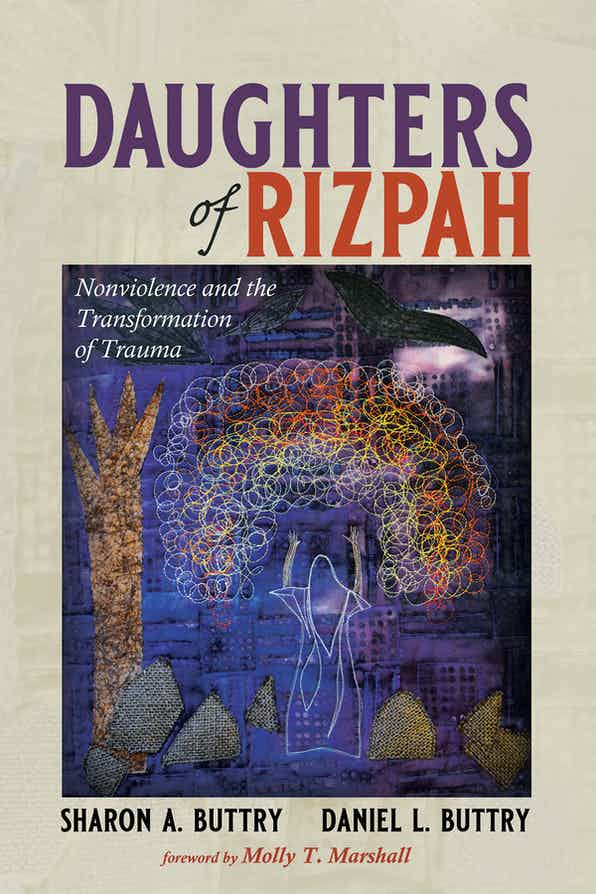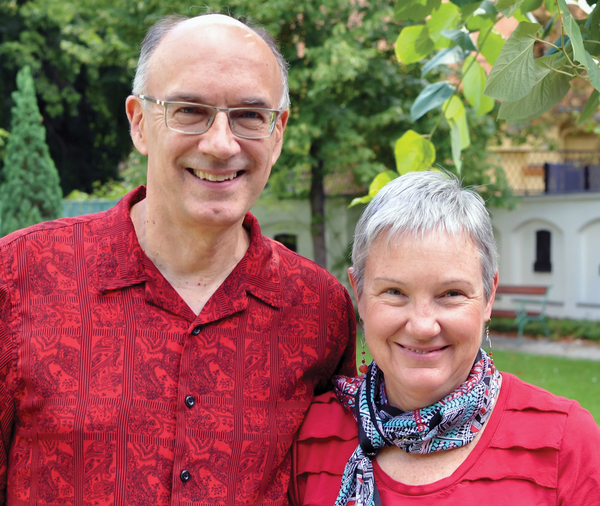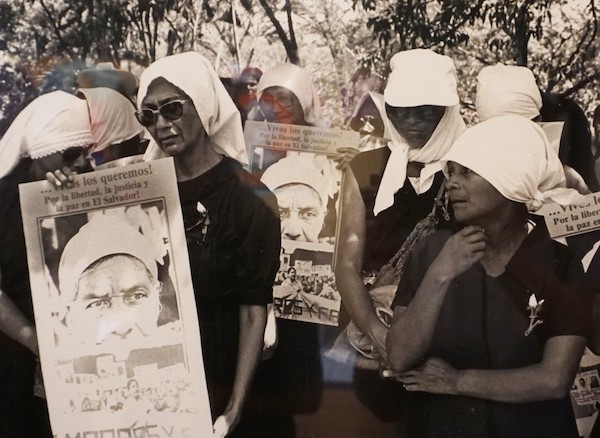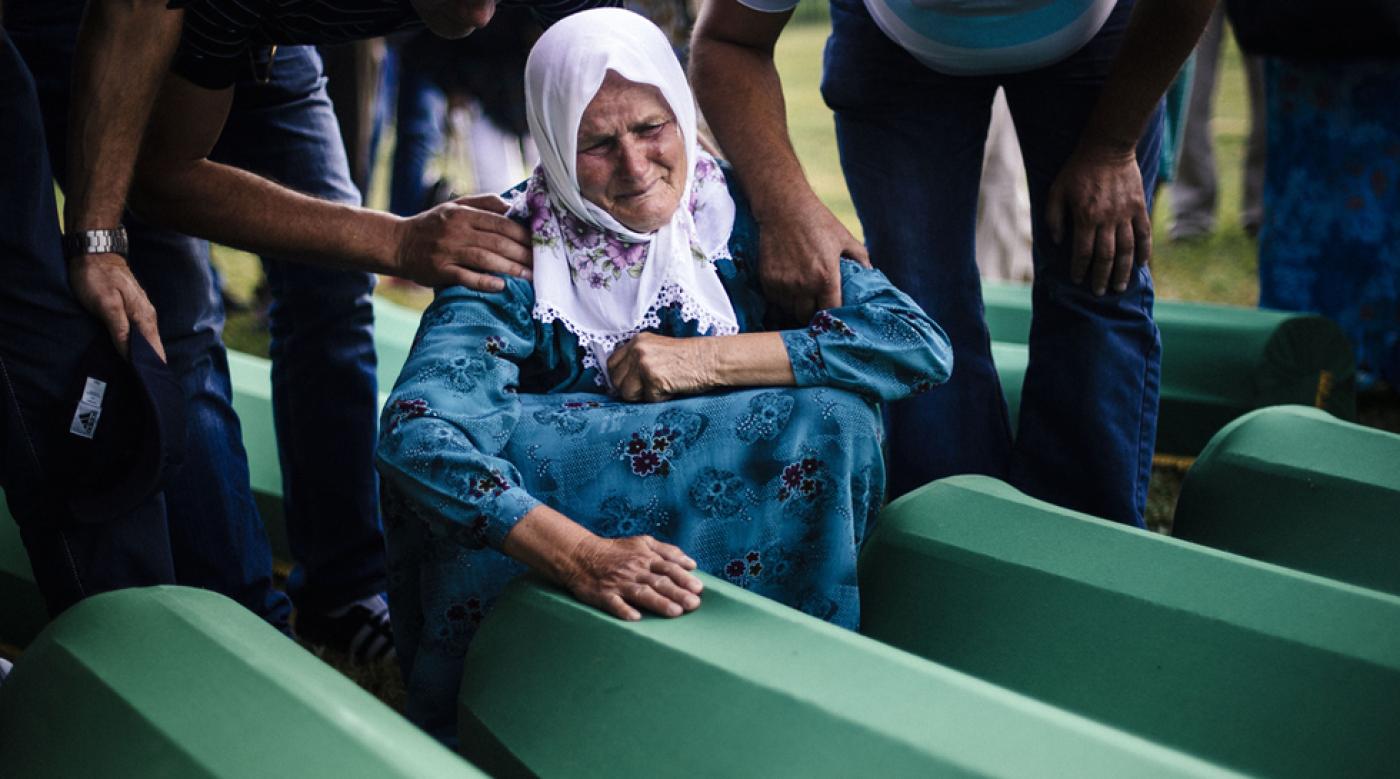Buttry, Sharon A. and Daniel L. Buttry. Daughters of Rizpah: Nonviolence and the Transformation of Trauma. Eugene, OR: Wipf and Stock Publishers, 2020.
Sharon and Dan Buttry have dedicated their lives to working for justice and peace. Out of their lifetime experience of faithful work, they have offered a true gift to the peacemakers of the world in Daughters of Rizpah. It is a little-known Biblical story found in 2 Sam. 21:1-14 that guides the writing of this book.

It is Rizpah’s story, a mother who defies the edicts of King David to preserve the dignity of her dead sons who were killed as political pawns. The story is one of what Sharon and Dan call “Terrible Stories” of the Biblical text that are filled with trauma. It is a story of how Rizpah models a way forward through the ghastly task of working through her personal trauma.
Why Rizpah, who was marginalized as the mother of two sons slain in the line of the deceased King Saul? Sharon and Dan state in the introduction, “Constructive change and justice rarely come from the top down.” Living at the margins allows Rizpah to truly grasp the scope of an unjust system, and then work to change that reality into a demand for actual justice.
“Living at the margins allows Rizpah to truly grasp the scope of an unjust system, and then work to change that reality into a demand for actual justice.“
Following the Rizpah story, Sharon and Dan examine various approaches to meeting trauma, as seen through the characters in the story. With an understanding of the challenges trauma presents, the authors walk through the Victim/Survivor Cycle, the Aggressor/Offender Response, and then to Transforming Trauma as portrayed by Rizpah. Readers are taken on a journey to examine how to respond to trauma with the hope of a constructive outcome that perhaps moves the needle towards reconciliation.
Following the Rizpah story, Sharon and Dan examine various approaches to meeting trauma, as seen through the characters in the story. With an understanding of the challenges trauma presents, the authors walk through the Victim/Survivor Cycle, the Aggressor/Offender Response, and then to Transforming Trauma as portrayed by Rizpah. Readers are taken on a journey to examine how to respond to trauma with the hope of a constructive outcome that perhaps moves the needle towards reconciliation.

In order to get to a place of healing and recovery, they write, one must first be willing to tell the difficult and terrible stories and do a “deep dive into the horror, into the heart of darkness. There in the depths, a light shines.” Only in doing the work of entering the terrible stories and discovering the truths evoked can the cycle of trauma and violence be interrupted and reimagined. This includes a willingness to approach the Biblical text and hold accountable the perpetrators of violence—even some who have been lauded as Biblical heroes.
The writers do not give a free pass to King David’s actions in the Rizpah story. David’s actions to satisfy a blood guilt with human sacrifices in the text are not to be glossed over. The theological wrestling and interpretation that must follow means this is a messy passage. It is not given to uncritical platitudes that excuse the actions of the aggressor, David.
“In order to get to a place of healing and recovery, they write, one must first be willing to tell the difficult and terrible stories and do a “deep dive into the horror, into the heart of darkness. There in the depths, a light shines.”
‘
Rizpah, the transformer of trauma, is held up by Sharon and Dan in a way that honors her courage and presents her as the real hero and model of the story that helps all who follow learn how to cope with their own battles with aggressors and the trauma they often enact. Also, the subject of “Where is God in trauma?” is given healthy attention. The writers find God giving voice and advocating for Rizpah, standing with the marginalized.
From here the book turns to naming the daughters of Rizpah, those who share in the lineage of transforming their deep trauma into new hope and new life through nonviolent efforts for justice in the face of great violence and oppression. Some of those listed are well known for their steadfast faithful courage to act against all odds, while others are a collection of the encounters Sharon and Dan have had through the years of traveling around the world working for peace and justice.

Picture archived in the Museo de la Palabra y la Imagen, San Salvador, El Salvador.
Powerful recollections of the Comadres of El Salvador, who were the mothers and relatives of those political prisoners who were abducted and assassinated between the late 1970s until the early 1990s, are included in the book as examples of dire trauma being transformed into light bearing justice through these faithful witnesses’ accounts.
The inspirational work of Naga mothers in India and their work for peace and reconciliation among warring factions, as they secured a ceasefire in 1997, provides a vivid example of the power of gathered commitment of mothers who want to see no more of their children die senselessly.
Some other heartening offerings include the Mothers of the Plaza de Mayo in Argentina, Cindy Sheehan and her vigil in the US against an unjust war, Leymah Gbowee of Liberia and the Mothers of Srebrenica from Bosnia and Herzegovina, to name a few.
“Sharon and Dan have provided an excellent resource for working through the deep psychological traumas many face, and then finding a path towards transforming one’s trauma into seeds of hope and life”
Sharon and Dan have provided an excellent resource for working through the deep psychological traumas many face, and then finding a path towards transforming one’s trauma into seeds of hope and life through the model of Rizpah and the surrogate daughters who have followed after her. It is an excellent read and an inspiring account of nonviolent action among the marginalized who seek justice and redemption for the sake of all of us.
This review first appeared in the “Baptist Peacemaker” the quarterly newsletter of the Baptist Peace Fellowship of North America and is posted with the permission of the author.
Rev. Dr. Daniel L. Buttry is the Global Consultant for Peace and Justice for International Ministries of the American Baptist Churches. He travels around the world training people in conflict transformation. Daniel is a founder and officer for the InterFaith Leadership Council in Metro Detroit. He has been involved in many mediation efforts, especially in Myanmar/Burma and with the Nagas of northeast India and northwest Myanmar. He has authored 9 books, mostly on peacemaking topics but also on church renewal and preaching.
Rev. Sharon Buttry is a part-time commissioned Global Consultant for Community Transformation with International Ministries. She is involved with the International Hope Center doing urban mission work and community organizing in Hamtramck, Michigan and is also an activist for environmental justice . She has joined Dan in many of his international travels, co-facilitating with him in the conflict transformation training.





























